New pool construction costs vary significantly depending on the size, materials, and accessories requested. Gunite pools are one of the best materials to use, but how much does a gunite pool cost to install? And is it worth it?
Gunite pools cost between $65,000 – $180,000 to install. The cost depends on the size of the pool, finishes, landscaping, accessories, and geographic location. Most gunite pools, post-COVID are over $100K.
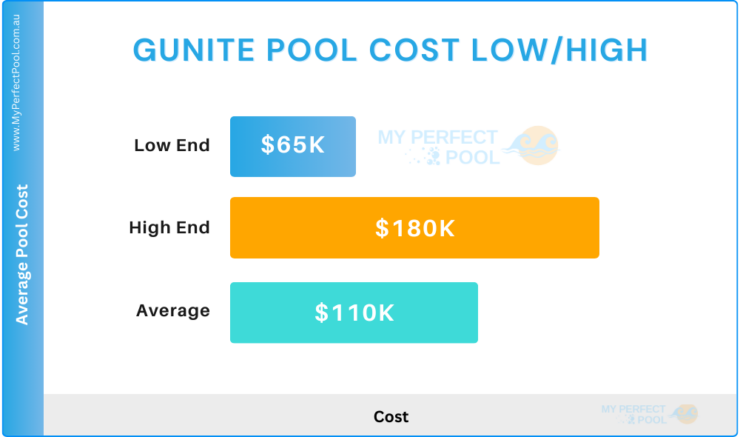
On the low end of the budget, the pool won’t include fences or landscaping. At the top end of the cost range, the pool will include landscaping, a coping/deck, and features like waterfalls, and spas.
Article Contents
Gunite Pool Pool Costs by Size
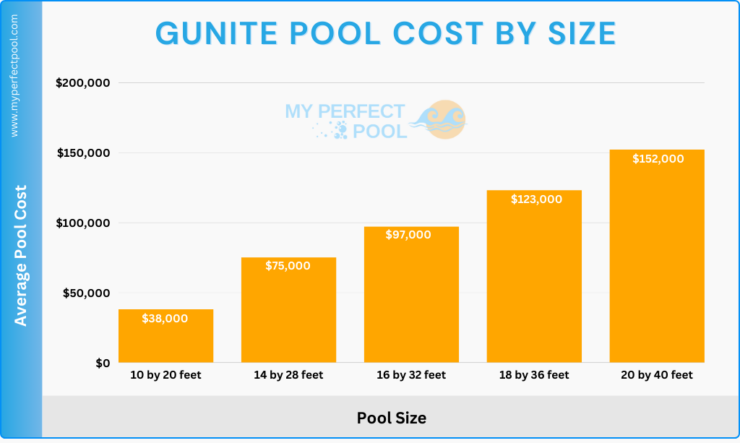
When it comes to gunite pool design, you can build just about any size and shape you want, space permitting. Vinyl pools, for example, cannot be customized and so there are only three sizes to choose from.
However, there are some common gunite concrete pool sizes and costs.
| Pool Size | Cost |
| 10 by 20 feet | $38,000 |
| 14 by 28 feet | $75,000 |
| 16 by 32 feet | Avg. $97,000 |
| 18 by 36 feet | $123,000 |
| 20 by 40 feet | Avg. $152,000 |
Gunite Pool Pool Costs Per Square Foot
Gunite pool installation ranges from $65,000 to $180,000 depending on the size of the pool.
That breaks down to $100 – $280 per square foot depending on your location, material costs at the time of build, and labor costs, which go into the final cost of the build.
Gunite Pool Cost (2023) Breakdown
The bigger the pool, the more the construction cost. Other factors are the material used, landscaping fees, pool equipment, excavation difficulty, and permit fees. All of these vary depending on where you live.
As a general rule, the price breakdown would be $100 – $280 per square foot for the gunite, which is $30,000 – $65,000 for a 14’ by 28’ foot pool. Additional features like diving boards, waterfalls, and spas can raise the price tag well over $100,000.
| Item / Service | Cost |
| Permits | $250 – $2,000 |
| Excavation | $2,500 – $4,000 |
| Waste Removal | $4,000 – $15,000 |
| Pool Shell & Finishes | $40,000 – $100,000 |
| Pool Equipment | $1,000 – $4,000 |
| Pool Heating | $1,500 – $8,000 |
| Landscaping (garden, deck, fence etc.) | $10,000 – $40,000K |
Permits ($250 – $2,000 average for all permits)
Depending on the area you live in, there are different permits that are applicable. The standard permits are:
- Building permit approx. $15 per $1,000 of valuation. e.g., A $120,000 gunite pool permit costs $1,800
- Electrical permit (Generally covered through building permit)
- A general contractor with a certified license for pool construction in your area
Gunite Pool Excavation ($2,500 – $4,500)
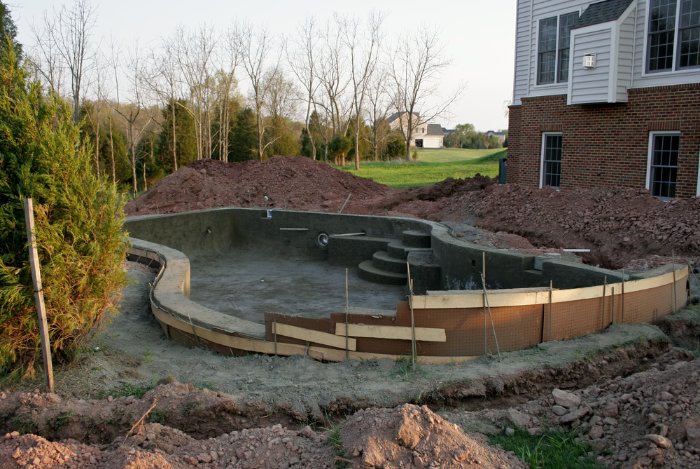
Excavation of a gunite swimming pool is $2,500 to $4,500 and depends on the size of the pool, the access to the site, and difficulty.
There are quite a few steps in pool excavation. The first step is to design the pool on a blueprint. Then, the contractor will lay out the design in your yard with wooden stakes and fluorescent tape to mark the spot where to dig and the shape of the pool.
After the preliminary work, debris such as trees, rocks, and root systems will have to be removed until there is a bare spot to dig. Then, machinery is brought in to start the ground excavation. A rebar is laid inside the pool to reinforce the concrete pool shell. The plumbing is laid out, and the pool and the deck are poured.
Make Room For The Heavy Machinery
To dig the pool, contractors will use heavy machinery like bulldozers. However, if your yard has a tight entry, a smaller track hoe can be used, but the construction will take 2-3 weeks longer. In rare cases, I’ve seen cranes lift the machinery over the house, but that’s usually not recommended.
The best contractors will make sure not to damage your yard by putting down sheets of wood and other materials to make sure the heavy machinery tracks will not tear up your yard. Discussing this process with your contractor before agreeing to a build is a good idea.
In this day and age, you can also look up the company’s history and reviews from previous clients. One of the major benefits of dealing with a reputable builder is that they take extra precautions to ensure the process goes as smoothly as possible.
Waste Removal ($4,000 – $15,000)
Once digging begins, a tremendous amount of dirt and rock needs to be removed from the property.
Fill removal costs are $184 – $224 per cubic yard. A 10’x20’ pool is about 37 cubic yards. Using the average of the rate ($204 per cubic yard), it would cost $7,548 to remove excess dirt.
The dirt and rock are removed the same day as it is dug out with a dump truck so that it doesn’t accumulate. Some soil will be left for backfilling, which makes building the deck easier.
The waste removal cost varies depending on the accessibility, weight, type of direct, permits, and location (geographic).
Plumbing & Electric
Gunite swimming pools use schedule 40 PVC, which is heavy-duty and long-lasting. The plumbing will run from the pool to your equipment pad, and be buried underground. The plumbing connects everything from skimmers, drains, to fountains, waterfalls, and the return lines.
Your new pool must have a dedicated circuit breaker installed to the electrical panel, and cables run from the panel to the pool equipment location. The cost of this varies depending on how far away the equipment is from the electrical supply.
The electrical receptacle for pools must be at least 8 feet away from the wall of the house and, if GFCI protected, must be at least 6 feet away from the pool. If the receptacle is not GFCI-protected, it must be 20 feet away. These regulations may vary from state to state.
Gunite Pool Finish Costs ($5 – $50+ per square foot)
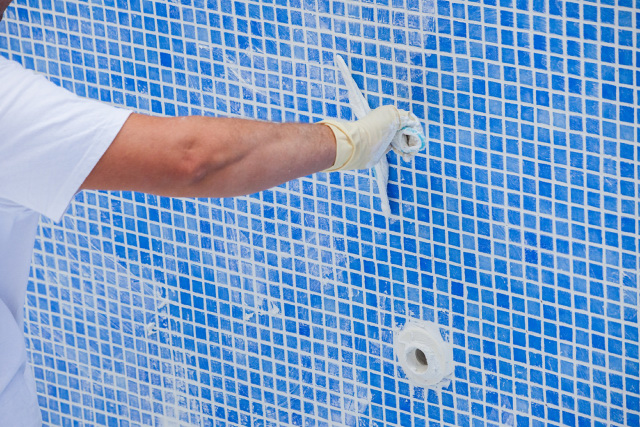
There are various pool sizes and finishes, and which one you choose depends on your budget, the size of your yard, and how much you are willing to budget for annual maintenance costs. The average size of an inground swimming pool is 10 by 20 feet to 20 to 40 feet wide and 6 to 8 feet deep.
Plaster (cheapest finish)
Plaster is the most common finish and comprises cement, water, and silica or marble dust. It has a smooth and classic finish and is the most popular choice in recent years. It’s the cheapest but doesn’t last as long as other finishes).
Aggregate (middle range cost)
Aggregate finishes are made with white or colored plaster mixed with glass, quartz, or river stones. The finish can be polished or exposed. This finish costs more than plaster, but it is far more durable.
Tile (most expensive)
Tile finishes are usually the most expensive pool finishes. That said, they are very durable and provide an amazing aesthetic to any pool. The glossy tiles reflect the water beautifully and make for a mirror-like appearance.
Pool Equipment ($1,000 – $5,000)
There are multiple pieces of equipment needed to operate a swimming pool. You will need a variable-speed pump, a pool light, and a filter that is either cartridge, sand, or DE, and you will need to choose whether to use chlorine or salt as your sanitizer.
The cost of pool equipment for a new pool is $1,000 to $5,000. The exact cost depends on the brands and size of the equipment (larger pools need bigger pumps/filters) and extras you may choose, such as automation.
Salt Vs. Chlorine
Saltwater pools are gaining popularity because they are more eco-friendly and easier to use than the traditional chlorine sanitation system. They are initially more expensive to set up, though. For example, a saltwater pool requires a chlorinator/saltwater generator that costs around $1,000 – $1,500. You won’t need that with a regular chlorinated pool
Pumps
Whilst single-speed pumps are the cheapest, they have been banned in Florida and possibly other regions to save on excessive electricity usage. So, if you are replacing a single-speed pump or building a new pool, it is now a requirement to install a variable-speed pump. This is better for the pool owner and the pool, as it saves excessive wear and considerable money on electricity.
Filters
Sand filters are the cheapest and are gaining ground over cartridge and DE filters because they do a great job of filtering the pool and are low maintenance. Cartridge filters cost about the same to install, but the cartridge(s) must be replaced every 1-3 years, which is an added expense.
Pool Heating ($1,500 – $8,000)
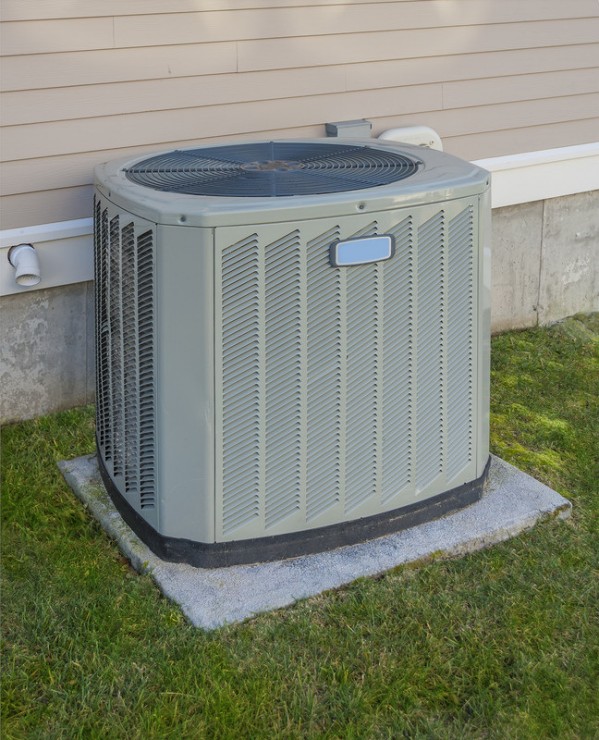
Pool heating will extend your swimming season by several months (depending on where you live). For many, the extra cost is well worth it.
The cost to install heating consists of the equipment cost and labor costs. Gas heating is generally the cheapest to buy and install. Heat pumps, solar, and electric pool heaters are also options.
Landscaping ($10,000 – $40,000K)
Whilst a basic pool may cost you $30 – 50K, this is unlikely to include any landscaping, fences, decks, patio, or lighting. When it comes to landscaping, your tastes and what you want to achieve will have a big impact on the cost. Professional landscaping can easily add $10 – $40K onto the cost of a pool.
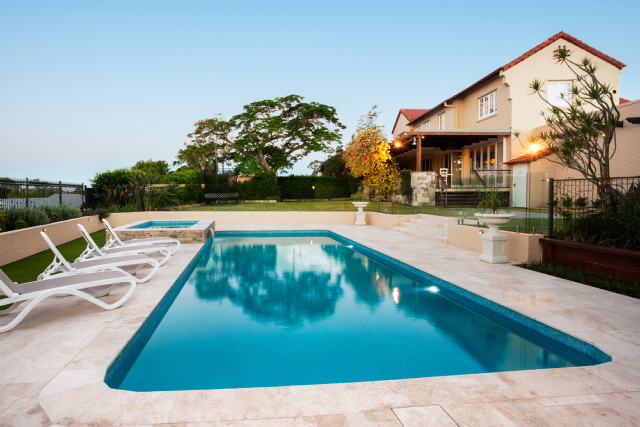
Landscaping is broken down into softscaping (plants, trees, grass, etc.) and hardscaping (patios, pool decks, firepits). Softscaping can be anywhere from a few hundred dollars to $10K. Hardscaping generally tends to cost much more and could be anything from $2,000 to $30,000
Geographic Location
Where you live will greatly determine your cost for a new pool build. Labor cost is the biggest variable, but there are also material costs, especially post-COVID-19 when there is still a transportation blockage. Different states also have different regulatory requirements for building pools, which can add to or subtract from your total cost.
That being said, winter is a downtime for most pool builders, and you may negotiate a lower price if you choose to build in the winter as opposed to building in the spring or summer.
Different Pool Costs Compared
| Type | Average Cost per SQ. foot | Pool Cost |
| Fiberglass | $15 – $30 | $20 – $50K |
| Concrete | $68 – $170 | $50 – $70K |
| Vinyl | $104 | $30 – $120K |
| Gunite | $100 – $280 | $65 – $180K |
Fiberglass
Fiberglass inground pools last around 25-30 years and are inexpensive to maintain. The downside is that they can only be built to 40 feet, which is more than enough for most people. However, if you are looking for something bigger, you must go with a different material.
Average cost: $20,000 – $80,000
Concrete
Concrete pools are another type of inground pool. They come in both shotcrete and gunite. They are durable and last around 50 years or so, which is why they cost more. They are more prone to algae issues than fiberglass pools because they are porous, but this shouldn’t be an issue as long as the pool is properly maintained.
Average cost: $50,000 – $100,000
Vinyl
Vinyl pools are customizable and have low maintenance costs, but the liner should be replaced every 10 – 12 years, so the initial cost is cheaper than other materials. Still, the lifetime costs are going to be higher.
Average cost: $30,000 – $120,000
Gunite
Gunite pools are the toughest material and have an average lifespan of 100 years. Like concrete, the material is porous, so it can be prone to algae growth. But if you want a highly durable lifetime pool, the upfront costs are worth it.
Average cost: $65,000 – $180,000
Are Gunite Pools Expensive?
Gunite pools are more expensive to install than other types of pools but are designed to last a lifetime. As explained earlier, the contractor has more control over the gunite during the building process, and that alone is reason enough to invest in gunite because it ensures an even pour and quality product.
Maintenance on a gunite pool is the same as concrete. It is a porous material that algae can easily form in, but like any pool, routine maintenance is required and will prevent algae growth. Gunite pools are the way to go if you are looking for a solid investment.
Is a Gunite Pool Pool Worth the Cost?
In my opinion, gunite pools are worth the cost. The initial sticker shock wears off once you see that the lifespan is double that of shotcrete and more than triple that of other building materials. It boils down to whether you are looking for a low upfront cost or a low long-term cost.
Gunite pools will be cheaper in the long run, but the initial cost will be higher. If you are a lifetime homeowner, this should be the material to build with because, material-wise, it’s a set-it-and-forget-it pool material.
What is the Cheapest Price for a Gunite Pool Pool?
The cheapest price for a gunite pool is $65,000 for a small pool. Some things you can do for a price reduction is land clearing such as removal of rocks and trees. In fact, if a contractor charges less than $60,000 on average, this should be a red flag.
Concrete pools are not cheap, but they are not cheap for a good reason. If you’re looking for a less expensive yet durable pool, shotcrete is the way to go. Shotcrete pools can last up to 50 years and are considerably less expensive.
Gunite Pool Cost Examples with Pictures
Here is a great forum thread with many pictures showing different pools and their cost. I highly recommend you check it out for some “concrete” examples of pool costs and what you can get for your money.

